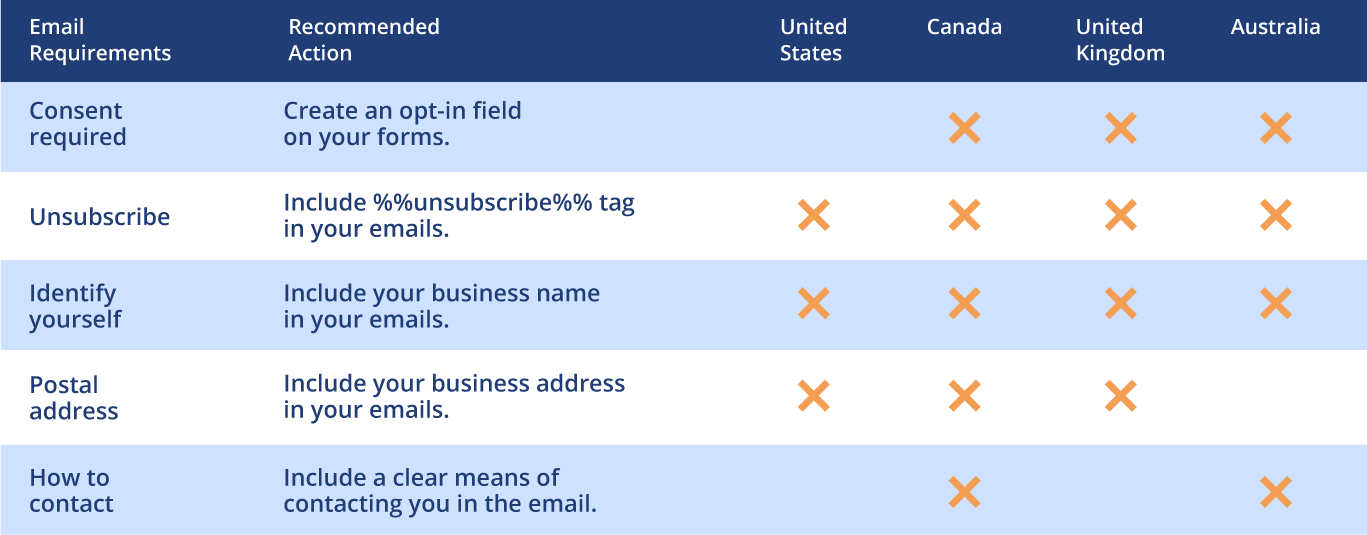Email laws and regulations are meant to protect consumers, but as a marketer, you need to know how penalties can affect your company and make sure you do your due diligence. In this chapter, we will explain the current legal environment that B2B marketers should be aware of and which Pardot features you can use to comply.
Permission-based email marketing
With email automation, we have to be especially careful that we are following all the relevant laws. Pardot requires all of its users to follow its permission-based email policy, meaning that emails are “requested, anticipated, personal, and relevant.” Following this policy will help keep your account in good standing with Pardot and will generally keep you out of legal trouble.
Here are the Pardot permission-based marketing best practices that will help you navigate the complicated legal environment of email marketing:
- Email people who want to be contacted by you: Only contact prospects who have opted in to receive emails from your company. One way to ensure compliance with Pardot is to have a checkbox at the bottom of your forms that indicates they read your permission-based email policy and agree to its terms.
- Make it easy to opt out: Pardot will not let you send an email if you don’t have the %%Unsubscribe%% link in the body of the email. Make sure that the unsubscribe link is easy to locate in your email template.
- Be transparent: Identify who the email is being sent from and include your address and contact information at the bottom.
- Be honest: Don’t write misleading subject lines. Recipients should know that the content is commercial before they open it.
- Monitor your email deliverability: Make sure the emails that you’re sending are consistently reaching your prospect’s inbox. Pardot encourages you to have a 90% deliverability on all your emails and will send you a firm reminder if you don’t.
Commercial email laws were put in place to curtail the rampant levels of email spam selling products and services. It’s a blessing for us as consumers but a headache as marketers. It’s particularly overwhelming as a marketer because every country—even some states and provinces—have their own laws and requirements in place for commercial emails.

B2B Marketer’s Guide to Pardot
Don’t have time to read the full guide right now? Download the B2B Marketer’s Guide to Pardot to read at your convenience.
Anti-spam email laws by country
We’re marketers, not lawyers. But let’s look at the big picture view of how these countries’ laws vary.

Ultimately, if you take away one thing from this section, it’s this:
Understand that sending commercial emails to residents of other countries comes with its own set of rules that you need to be mindful of.
If you’re looking for more information, here are some additional resources:
If you do business in the European Union, Pardot has a feature that will create a cookie consent pop-up on your website. Pardot is smart enough to know, based on IP address, whether or not to display that pop-up.
The EU’s GDPR and other data privacy directives can get very complicated very quickly. We thought it would be outside the scope of this article to get into details of it. Here is another resource that elaborates further on the EU’s data privacy and communication protection laws: The Beginner’s Guide to the GDPR.
* This content piece provides a rough overview of international laws that affect email marketing. Under no circumstances should this be taken as legal advice. If you are seeking legal advice, consult an attorney.


